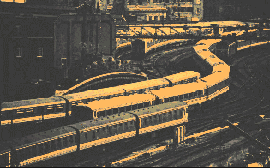

 |


 The Second Ladbroke Rail Inquiry, chaired by Lord Cullen, took place throughout November and December 2000. The findings were published in 2001. This report deals with the management of safety and the regulatory regime. Two reports were quoted at length. They were commissioned by Railtrack, undertaken by DuPont(UK), detailing the management of safety within Connex Rail and First North Western. Mr J Kooger, Senior Consultant for DuPont Safety Resources was questioned during the Inquiry.
The Second Ladbroke Rail Inquiry, chaired by Lord Cullen, took place throughout November and December 2000. The findings were published in 2001. This report deals with the management of safety and the regulatory regime. Two reports were quoted at length. They were commissioned by Railtrack, undertaken by DuPont(UK), detailing the management of safety within Connex Rail and First North Western. Mr J Kooger, Senior Consultant for DuPont Safety Resources was questioned during the Inquiry.The Cullen Report findings showed that while there were good examples to be found amongst train operating companies there were also the bad, quoting (Section 5.20) the DuPont report on Connex: "The commitment to safety of senior executives is not visible at the working and operational level and the safety policy lacks credibility in the eyes of the employees." Under the section 'Continuous Learning' the Cullen Report states (5.51): "One particular criticism of the “blame culture” was said to be that it inhibited the industry from the proper investigation of accidents and incidents, and the open sharing of information." "In the words of the DuPont report, there was a tendency to look for "the guilty party rather than the act and the reasons behind it. The blame culture was also said to inhibit staff from reporting non-serious accidents. The significance of this weakness was clear from the emphasis which a number of witnesses laid on the importance, within a successful safety culture, of continuously learning the lessons of accidents and incidents in order to prevent them from re-occurring, and to having clear and consistent processes to enable that to happen. An organisation which learned from accidents, incidents and failures of management would be more likely to implement change than an organisation which was “in denial”." This description of a company "in denial" will ring a few bells not only with Connex staff but with the hundreds of workers that have left Connex, were forced out or were sacked. |
"Accident investigations are geared to find the person to blame and not to find the unsafe act." During the Inquiry, on 1st November, the DuPont Report on Connex Rail was quoted: "A strong general impression we gained was that Connex has a very heavy blame culture. Staff are always on the lookout for someone to blame for any type of real or imagined mishap." "All efforts could be made to eliminate the blame culture. The commitment to safety of senior executives is not visible at the working and operational level and the safety policy lacks credibility in the eyes of the employees?" On day 5, 6th November, the following section was referred to: "Accident investigations are geared to find the person to blame and not to find the unsafe act. The investigations are very superficial and hardly ever is an effort made to discover the root causes, the removal of which is the only guarantee of preventing a recurrence of the same or a similar incident." On day 23, 5th December, the section of the DuPont Report that dealt with safety audits was quoted: "In spite of the responsibilities outlined in the safety policy very few senior managers make safety tours. Audits are carried out by designated safety auditors whose main aim is checking for compliance with rules and regulations of the safety case and the rule book. [csenews.net: Safety representatives found that managers were very selective in deciding which regulations to comply with and which to ignore.] Dupont type of audits which are carried out to promote understanding between the employees an their superiors and which provide a platform for propagating the safety message are not held at any level." Throughout the Inquiry, the references to Connex practices were no doubt seen as useful in as much as the participants could see examples of serious failings in safety management within the railway industry. |
| The Cullen Report Part 2 > Home |

 |